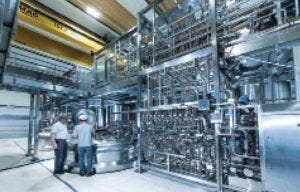Voices of Biotech
Podcast: MilliporeSigma says education vital to creating unbreakable chain for sustainability
MilliporeSigma discusses the importance of people, education, and the benefits of embracing discomfort to bolster sustainability efforts.
Sponsored by Zeta Pharmaceuticals

Lindsay Smart, CEO of ZETA USA (right) and Andreas Marchler, CEO of ZETA Holding (left)
One of the most impactful innovations over the past 20 years of biopharmaceutical production has been the digital transformation of manufacturing processes. As executives of a solution provider for the pharmaceutical and biotechnology industries, we have witnessed the ongoing evolutions and applications of digital technologies. When digitalization is applied intelligently, time to market is shortened, and engineering, construction, commissioning, and qualification activities are accelerated.
Digital platforms enable the aggregation of massive amounts of data derived from different sources such as engineering or process monitoring. Consistent, comprehensive, and detailed data acquisition and the provision of those data in digital form (e.g., as virtual images or a digital twin of a bioprocessing plant) can increase efficiency significantly. Biomanufacturers can address issues related to engineering, technology transfer, plant operation, and maintenance. Efficient, holistic digitalization solutions support companies and enable them to respond with the necessary agility, flexibility, and adaptability.
The past 20 years also have brought on surprising scientific breakthroughs, including the invention of gene-editing tools such as those based on clustered regularly interspaced short palindromic repeats (CRISPR) and CRISPR-associated protein 9 (Cas9). Discovered by Nobel Prize winners Emmanuelle Charpentier and Jennifer Doudna, the “molecular scissors” enable scientists to alter the DNA of different organisms with fast results and high precision. CRISPR–Cas9 is considered to be one of the most potentially transformative technologies in human history. Although therapies based on it are still in development, they will inevitably transform the lives of patients and the shape of the biopharmaceutical industry.
Further remarkable developments have been made in enzyme-based catalysis. The use of enzymes in biocatalytic applications in the biopharmaceutical industry continues to expand. New biocatalysts are being discovered by genome mining and screening methods. Powerful and revolutionary enzyme-engineering techniques provide opportunities for tailoring existing enzymes and constructing new biocatalysts for safe and efficient active pharmaceutical ingredient (API) production.
More biotechnology-based products than ever before are being developed and approved for food production, therapeutic use/application, and bioprocess feeds. This trend is steadily increasing the need for production capacity, thus opening an opportunity for the biopharmaceutical industry. It is up to biopharmaceutical companies to seize that opportunity.
Over the past 20 years, biomanufacturers have continued to adopt single-use technologies for the development and processing of biopharmaceuticals. ZETA began as a manufacturer of highly customized stainless-steel systems. But with the increased adoption of single-use technologies, the company has been able to change its approach to the market. ZETA now is playing a leading role in the design, engineering, and fabrication of customized single-use–stainless-steel hybrid facilities, delivering fully integrated automation solutions for equipment as well. The company is providing design and implementation services for stainless-steel and single-use systems according to the needs and requirements of its customers and based on considerations of cost and time to market.
One-Stop-Shop Innovations
In addition to planning, design, development, manufacturing, automation, digitalization, and maintenance of customer-specific process solutions, ZETA can combine the planning of heating, ventilation, and air conditioning (HVAC) systems and cleanroom technologies at the same location. The company has established itself internationally as a one-stop shop for the biopharmaceutical industry, offering turn-key solutions from the first project idea until the hand-over of a fully good manufacturing practices (GMP)-compliant facility.
One of ZETA’s most outstanding recent achievements was a large-scale customized engineering, procurement, and construction management (EPCM) project completed in 24 months. The customer demanded that highly ambitious timeline to meet its stringent objectives of increasing the global availability of a vaccine. A project of that magnitude completed in only 24 months, particularly considering its size and complexity, is almost unheard of. The project was a huge accomplishment, and everyone involved should be extremely proud of what they achieved. Successful fast-track project delivery is at the heart of what ZETA does to meet its mission to get safe and effective medicines to patients quickly.
Training and Retaining a Qualified, Talented Workforce
Attracting, training, and retaining a qualified workforce are our primary concerns and main challenges in the industry. To address these concerns, large and small biopharmaceutical companies are reaching out to ZETA to accelerate their end-to-end drug production when they need well-qualified subject matter expertise, especially in the area of highly customized aseptic process solutions.
Smart approaches are required to train a geographically dispersed workforce according to best practice standards. Reading standard operating procedures (SOP) manuals is time-consuming and insufficient for training and staff development. That and other traditional approaches alone no longer will lead to success.
Using an integrated engineering platform, ZETA’s engineers can work on a project simultaneously, anywhere globally and in real time. That sets ZETA apart and has enabled the company to deliver projects on time and in full globally, even throughout the COVID-19 pandemic. Technological advancements are essential, but ZETA could not have achieved its strong market position without its dedicated and highly skilled team.
Enabling Drug-Product Affordability
According to the United Nations Industrial Development Organization (UNIDO), more than two billion people worldwide cannot get the medicines that they need. In the future, ZETA believes that access to high-quality medicine should be able to reach even the furthest corners of the world. That will contribute significantly to saving more lives quickly and improving overall quality of life for people of all ages.
Leading biopharmaceutical companies realize the importance of local biopharmaceutical production combined with leading technologies to make therapeutics more accessible and cost-effective. Technologies such as automation, digitalization, and artificial intelligence as well as approaches such as application of single-use technologies and production process intensification are helping to make therapeutics more cost-effective and affordable.
ZETA is highly confident that the cost of essential medicines will be reduced so that patients worldwide can afford them, regardless of their income. And we sincerely hope that cancer will be cured and that effective therapies against Alzheimer’s disease, Parkinson’s disease, and other debilitating diseases will be available. We continue to hope for effective treatments that alleviate suffering and improve the quality of life. Advances in medical research will bring those goals closer to reality.

ZETA is trusted by the world’s largest pharmaceutical, biopharmaceutical, and biotechnology companies as the aseptic process expert in complex customized engineering projects.
ZETA is poised to continue on its impressive current growth trajectory, thanks to the outstanding efforts of its highly knowledgeable teams. We are incredibly proud of our accomplishments and look forward to helping our customers address their biomanufacturing needs of the future.
About ZETA
With over 1,000 highly qualified employees and 17 subsidiaries worldwide, ZETA specializes in engineering, automation, digitalization, and qualification of customized biopharmaceutical facilities for aseptic process solutions. ZETA is a one-stop-shop company, combining plant engineering and automation with HVAC and cleanroom design. ZETA is taking steps toward a more environmentally friendly future for the entire industry. With ZETA’s well-designed decarbonization and sustainability strategies, reduced carbon emissions and energy efficiencies can be achieved in biomanufacturing processes and facilities.
Biopharmaceutical active ingredients such as anticancer drugs, insulin, vaccines, and infusions are produced in highly complex, “tailor-made” facilities. ZETA supports its customers across the entire drug development and manufacturing pathway with sophisticated solutions from laboratory to industrial production scales. ZETA creates digital twins of process plants through its smart engineering services (SES) and is a market leader for digital solutions in the pharmaceutical and biotechnology industry.
Andreas Marchler ([email protected]) is chief executive officer at ZETA Holding. Lindsay Smart ([email protected]) is chief executive officer at ZETA USA.
You May Also Like